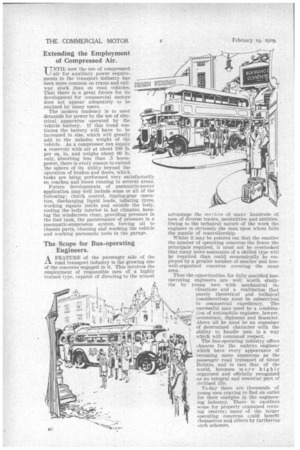Extending the Employment of Compressed Air.
Page 92

If you've noticed an error in this article please click here to report it so we can fix it.
UNTIL now the use of compressed air for auxiliary power requirements in the transport industry has been more common on trains and railway stock than on road vehicles. That there is a great future for its development for commercial motors does not appear adequately to be realized by many users.
The modern tendency is to meet demands for power by the use of electrical apparatus operated by the vehicle battery. If this trend continues the battery will have to be Increased in size, which will greatly add to the unladen weight of the vehicle. As a compressor can supply a reservoir with air at about 100 lb. per sq. in. and weighs about 60 lb. only, absorbing less than .5 horsepower, there is every reason to extend the sphere of its Utility beyond the operation of brakes and doors, which tasks are being performed very satisfactorily on coaches and buses running in several areas.
Future developments of pneumatic-power application may well include some or all of the following : clutch control, tipping-gear operation, discharging liquid loads, inflating tyres, working signals inside and outside the body, cooling the body interior in hot climates, keeping the windscreen clear, providing pressure in the fuel tank, the maintenance of pressure in a pneumatic-suspension system, forcing oil to chassis parts, cleaning and washing the vehicle and working pneumatic tools in the garage.
The Scope for Bus-operating Engineers.
A FEATURE of the passenger side of the -El road transport industry is the growing size of the concerns engaged in it. This involves the employment of responsible men of a highly trained type, capable of directing to the utmost
advantage the Services of many hundreds of men of diverse trades, mentalities and abilities. Owing to the technical natur'e of the work the engineer is obviously the man upon whom falls the mantle of controllership.
Whilst it may be pointed out that the smaller the number of operating concerns the fewer the principals required, it must not be overlooked that many more assistants of a skilled type will be required than could economically be employed by a greater number of smaller and lesswell-organized concerns covering the same area.
Thus the opportunities for fully qualified busoperating engineers are well worth studying by young men with mechanical inclinations and a realization that purely theoretical and technical considerations must be subservient to commercial expediency. The successful man must be a combina*; lion of automobile engineer, lawyer, accountant, diplomat and financier. Above all he must be an organizer , of determined character with the ability to handle men in a way which will command respect.
The bus-operating industry offers chances for the embryo engineer _ which have every appearance of becoming more numerous as. the passenger road transport of Great Britain, and in fact that Of the world, becomes more highly organized and officially recognized as an integral and essential part of civilized life To-day there are thousands of young men .craving to find an outlet for their energies in the engineering industry. There is excellent scope for properly organized training centres ; many of the larger operating concerns could . benefit themselves and others by furthering such schemes.




























































































































































































































